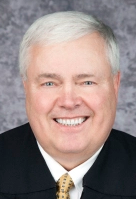Industry Insights
September 30, 2020
Wyatt: Fact, Not Fiction: Mediation Works
- State: Tennessee
- - 0 shares
Did you know that television’s beloved Fred Rogers, aka Mr. Rogers, was a Navy SEAL sniper in an earlier career? Or that if you lose a tooth and place it in a glass of Coca-Cola at bedtime, by morning it will be dissolved? And if you go to New York City, beware of alligators living in the sewers.

Judge Thomas Wyatt
These are three old yet popular urban legends. They’re (mostly) untrue, yet they proliferate.
How do urban legends like this get started? Someone says it; others repeat it; somebody challenges it; and the defense to the challenge has more conviction than the original statement. As we see over and over, if we hear something enough times, some people will believe it’s true. Sometimes, they’re just told in fun. But other times, urban legends can be dangerous.
Case in point: We in the Court of Workers’ Compensation Claims have begun hearing the urban legend that the purpose of post-discovery mediation is solely to certify issues for a compensation hearing.
Let me state this as clearly as I can: This legend is not true. I have never heard any judge or bureau representative say or write such a thing. This is contrary to the clear language of the enabling law.
Tennessee Code Annotated section 50-6-236(d)(1) (2019) reads, “[I]f the parties are unable to reach settlement of any disputed issues, the mediator shall issue a written dispute certification notice setting forth all unresolved issues for hearing before a workers’ compensation judge.”
This statutory enactment makes it clear that the primary purpose of post-discovery mediation is to give the parties and their attorneys a free and effective opportunity to resolve a case without bearing the risks, stress and expense of trial. The certification of issues occurs only when the primary purpose of the statute doesn’t occur.
I wonder if the thought that post-discovery mediation is primarily for certifying issues is fueled by closed-mindedness of the parties or poor preparation by the attorneys. The party or attorney operating under this misconception probably ignores the mediator’s pre-mediation request for information.
Maybe the attorney has failed to properly prepare his or her client on the issues in the case and the benefit (and requirement) of good-faith participation in mediation. This attorney might want to blow through the mediation as quickly as possible by, for example, failing to be sufficiently prepared to participate during the important joint opening session.
Finally, parties might think mediation is unnecessary because they’re right and nothing can change their mind.
Before embarking on this type of conduct, the parties and their lawyers should consider Tennessee Code Annotated section 50-6-236(c)(1), which provides that a person representing both parties shall attend the mediation and “be prepared to mediate all disputed issues at the beginning of mediation and shall mediate all issues in good faith.”
Section 50-6-236(c)(2) empowers a mediator to comment in the dispute certification notice that a party and/or attorney didn’t mediate in good faith. Section 50-6-236(g) allows the workers’ compensation judge to assess attorneys' fees and costs against a party who doesn’t mediate in good faith by failing to produce requested documents, cooperate in scheduling (including failing to appear at a scheduled mediation) or provide a party in attendance with authority to settle.
Hopefully, the parties won’t need the threat of sanctions to mediate in good faith. The bureau’s mediators provide a service that is beneficial and essential to the parties and the system. Mediation is free and effective in resolving issues. The bureau’s mediators are well-trained and genuinely interested in facilitating a fair, agreed resolution. Further, avoiding trial manages risk. Somebody loses every trial and, often, neither side gets exactly what they sought.
Whatever your preconceived ideas about mediation, please give it a fair shot through preparation and open-mindedness. Like surgery, trial is expensive and stressful. I don’t know anyone who wouldn’t avoid surgery if they could return to health without it.
Speaking of surgery, did you hear about the businessman who traveled to New York City? He carefully avoided the sewer gators, but when he stopped for a post-work Coke, his tooth fell in it and promptly dissolved. Even worse, someone slipped something in his drink. He woke up in a bathtub with his kidney harvested. It was later sold on the black market!
OK, that’s another urban legend. But since it was a work trip, I wonder if it would be compensable.
Thomas Wyatt is a judge in the Tennessee Court of Workers' Compensation Claims, Chattanooga. This entry is republished with permission from the court's blog.
Advertisements
Columns
- Wade: Are the Old Ways Gone? 06/13/25
- Snyder: Trust Your Intuition 06/12/25
- Montgomery: DIR Director Reportedly Resigning 06/11/25
- Gelman: Supreme Court to Review COVID Compensability 06/06/25
- Paduda: WCRI's New Studies 06/05/25
- Moore: 187 Pages of WCRI State Stats 06/02/25
- Paduda: The Gutting of NIOSH 05/30/25
- CAAA: Left in the Smoke 05/28/25
- Gelman: Intentional Wrong? 05/27/25
- Wroten: State's Workers' Comp Crisis a Stark Contrast to National Stability 05/23/25
- Montgomery: Comp Is a Cash Cow, but Insurers Want Higher Rates 05/21/25
- Snyder: Credible Negotiation 05/19/25
- Paduda: The State of Work Comp 05/16/25
- Snyder: Two Opposing Views on Litigation Management 05/14/25
- Montgomery: City Pays Doctor $32 to Treat Injured Employee 05/12/25
- Gelman: Medical Reports Matter 05/09/25
- Montgomery: Rand Gets $300K for UR Study. What's the ROI? 05/05/25
- Salem: Respondent Who Is Not Employer May Not Owe Filing Fee 05/02/25
- Gelman: When Credibility Crumbles 04/30/25
- Montgomery: More States Move to Expand Workers' Comp PTSD Coverage 04/28/25
Now Trending
- Workers' Compensation News
-
Calif. Crackdown
on Tech in Workplace Could Hit…
Posted on Jun 12, 2025
-
Calif. Attorney
Tom Girardi Sentenced to 87 Months
for Stealing From…
Posted on Jun 6, 2025
-
Calif. Hospital
Presumption, Bill Review and Fraud
Reporting Measures…
Posted on Jun 6, 2025
-
Calif. 3rd DCA
Publishes Decision That Erroneous
Evidentiary Rulings Aren't…
Posted on Jun 13, 2025James Witkop says: “Another case that was published via the efforts of the California Lawyers…”
-
Calif. Court
Publishes Decision Applying
Sovereign Immunity to Tribal Health
Care…
Posted on Jun 11, 2025
-
Alaska Supreme
Court Revives Worker's Maritime
Tort Claims for Accident on…
Posted on Jun 10, 2025
-
Calif. Senate
Committee Passes State Hospital
Worker…
Posted on Jun 13, 2025
-
Maine Supreme
Judicial Court Says Worker Did Not
Timely File Petition to Restore…
Posted on Jun 6, 2025
-
Ohio Supreme Court
Says Widow Can't Get Schedule Loss
Compensation as Surviving…
Posted on Jun 13, 2025
-
Ntl. CMS Hosting
Webinar on Introduction to…
Posted on Jun 13, 2025
Jobs
Upcoming Events
Jun 11-13, 2025
CCWC 2025 Educational Conferen
For two decades, CCWC has assembled the key players in the workers’ compensation arena for what is …
Jun 14-28, 2025
2025 Legal Specialization Test
Course Description: This 3-part series instructed by experienced workers’ compensation attorney an …
Sep 2-4, 2025
San Diego Elevate Workers' Com
We are thrilled to announce that Early Bird registration is OPEN for ELEVATE® 2025! This year's …
Social Media Links
c/o Business Insurance Holdings, Inc.
Greenwich, CT 06836




No Comments
Log in to post a comment